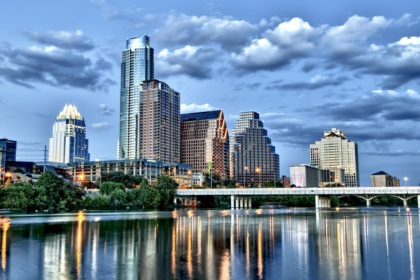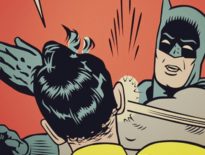
I had the honor of joining Austin Inno’s Billy Utt today on The Beat. His usual host, the resplendent Brent Winstom, was I’m sure preparing to cheer Dwyer or Haas to the 200m freestyle gold tonight, so I was called up from the deck to chat live about the latest in Austin innovation, via The Beat newsletter. The Austin Inno Beat is a daily newsletter that covers the Austin startup, tech, and venture community.
Here’s the latest as far as we’re concerned. Be sure to subscribe to their regular Beat here and follow Austin Inno for more!
Article Highlights
The Austin Inno Beat
We’re chatting with Paul O’Brien, a startup mentor, investor and prolific writer who you can also catch next week in person at the cofounder pitches at Capital Factory.
Psst, we’re hiring an editorial intern for the fall. Get the details here.
Billy: 2016 has been a relatively slow year for VC investing across the board. That’s not exactly surprising, since 2015 will be forever known as The Year of the Unicorn and of course that type of activity can’t last forever.
And 2015 rocked in Austin too. On a local level, we’re number ten nationwide in terms of overall VC activity in the region, according to PitchBook‘s 2016 U.S. Venture Ecosystem FactBook. That’s not as high as we’d like, but still respectable. First round capital raises reached their peak in 2015, growing from 56 in 2010 to 110, which is great news for the long-term health of the Austin startup scene.
But not all is rosy in the world of VC. Nationally, 2016 VC investing is on pace for a 32% drop from the heady days of 2015, and locally, outside investors are taking a bigger piece of Austin fundings. The report states outside investments grew 186% between ’10 and ’15 while local investment only rose 63%. But it’s worth noting that Austin Ventures was still kicking it back then.
Paul, you’ve got your ear to the ground from an operator and investor standpoint. What are some key things we need to focus on in Austin to put these numbers in perspective?
Paul: Uncertainty. Look, if 2015 was the Year of the Unicorn, 2016 is the year of frustrating uncertainty. Just look at the explosion of data oriented companies, even here in Austin with Brett Hurt’s data.world, to appreciate that people are fed up with not knowing and seeking clarity.
Clarity sounds like a trumped up buzzword (pun intended), but that’s exactly what the industry is increasingly demanding. The last decade has witnessed an awakening of the world to the information age. We can claim that we’ve been in it since the dawn of the internet but that’s really not accurate because The Valley largely held a monopoly on the potential of the web. Sure, products and services popped up elsewhere, but not with the breadth and scale of companies like Facebook, Twitter, and Google. That’s not a criticism, it’s an observation that the first part of this century is when everywhere else started to realize what it meant: all that information, on demand, about anything.
In Austin we’ve seen traditionally non-tech industries transforming because of information. Civitas Learning, Trendkite, RealMassive, Spredfast and Dachis Group (now Sprinklr), and BP3 — Austinites are looking at education, energy, politics, and real estate and saying, “hang on, we can KNOW what’s going on in that industry, why are we still doing things the old way?”
And it’s that uncertainty that’s causing us to rethink the venture capital economy. Yes, Austin Ventures is dissolving, in name, but the partners are still involved in Austin and new firms are emerging trying to work out the future of the Austin economy and how to fund it.
As investors in funds look to their traditional investments in Oil & Gas, Real Estate, and other Texas markets, they’re asking IF and HOW they can find better opportunities in startups and other innovation. What’s exciting about Austin’s potential is that we’re anticipating the burst of those recent unicorns precisely because of the uncertainty weighing on us — through the Presidential election. Clinton? Trump? Ugh. But Texas traditionally stands independent. Austin is an amazing balance of Right and Left, unique in the world. While we wait for the uncertainty of the election to work itself out, Austin is building the technologies that will alleviate uncertainties and it’s able to do so with a balanced economy, politics, and culture that will shine throughout the political fiasco we’re witnessing.
Billy: In Making Moves, we’re usually talking about companies doing stuff in Austin, but we’re seeing a departure today. Legal Holdings LLC, d.b.a. Easy Expunctions is heading down to San Antonio. The company is a software-based service that helps people clean and expunge criminal records cheaper than law offices. They charge roughly $500 to expunge criminal records from public databases and search results, a nice price to pay compared to over $1K at typical law offices.
But this is the kind of expunction that Austin startup scene doesn’t want to see…
Paul: It does beg a question of why they’re moving. The hot discussion in Austin of late has been whether or not the local economy is helping or hurting entrepreneurship. And in the context of our first point, I can’t help but always wonder, how is it, if we’re the hottest startup community in the world, we still can’t seem to overcome the challenge of having a substantial amount of venture capital taking risks? Something is amiss and departures, as well as startups needing to raise capital elsewhere, should be explored as a sign of what we’re missing.
Billy: QuickGifts, an online marketplace for gift cards, has raised a $500K debt round according to a filing. The Austin company gives retailers the capability to sell their gift cards online and lets consumers shop online using retailer’s gift cards. The company has raised about $3M to date.
Billy: What’s the number again? 454? No, 523. Wait, never mind. It’s actually 483. Yea, 483.
This is the type of uncertainty that has many people in Austin scratching their heads. These were the numbers presented by the Austin Police Departmentwhen asked about DWI crash statistics in Austin in 2014.
The statistics were an integral part in the debate over Uber and Lyft, showing how significant the change in DWI crashes was as a result of the ride-hailing companies operating in Austin. When asked for the statistics, APD provided those above numbers at different times, which meant there could have been a decrease in DWI crashes from 23% to 12%, but ultimately settling on a 17% decrease in 2014.
“Experts say the department made simple errors that could easily be avoided, raising questions about the overall quality of its statistics work,” according to the Statesman.
Paul: The broader question I’d like to see us exploring about “Austin” is just that. The broader scene. Let’s start waking up to the fact that Austin is a metropolitan area. We may not want it (or rather, some may not want that) but it’s no less the fact. The I-35 corridor to San Antonio is rapidly becoming urban, and with San Antonio an hour away, it’s no less a part of where we live than Hollywood is to LA. The Domain is now our second city and Highland will soon be our third urban center. WeWork is now north of campus, as well as downtown, and word has it they have plans for other locations.
The data constantly explored about Austin, to make cases about public transportation, crime, DWI, and so forth, are reported in the context of the City of Austin and that’s terribly misleading. Simply put, the Austin tech scene is now a question of where you are in Austin, and where you should be.
Have the changes in ridesharing affected incidents of DWI? Let’s have some common sense, of course they have. How much so? We’ll never know. I used to rideshare from downtown to my home by Lake Travis and for a time there, I couldn’t. How much of that data is ignored because of people who don’t technically live in downtown “Austin”?
- From Recode: A new flaw puts nearly a billion phones at risk and shows Android security is still a patchwork mess
- From The Wall Street Journal: Why Uber Might Stalk an IPO Sooner Rather Than Later
- From The New York Times: How to Give Rural America Broadband? Look to the Early 1900s

Billy: “The perfect gift for the speech lover in your life or a solid investment in a rare collectible.”
“The perfect gift for the speech lover in your life or a solid investment in a rare collectible.”
That’s what we’re calling phones these days, according to an amusing Austin Craigslist post offering vintage “classic communications devices.”
While funny, the post does elicit some nostalgia. For example, It’s pretty crazy that there are kids that will never know the sound of an answering machine beep or rotary dialing. Paul, are there any tactile experiences from your life that today’s generation will never understand the pain or joy of?
Paul: Did you read the hilarious Thrillist article, 10 Things People in Austin are Irrationally Passionate About? What a way to endcap all these points! Does that list represent Austin? Austinites? No, not really because it’s representative of a sample, and yet it does. And what’s on this list in this context? Cord-cutting. Think about that… what will today’s generation, or more accurately the next, know of cord cutting? What is a cord??
A characteristic of what makes Austin Austin is that it’s wonderfully nostalgic and local, (perhaps to a fault?) Look at that list and much of what we’re passionate about is born of Austin. All the tension we have over growth, change, startups, etc. are born of Austin once being great, still being great, and with the brightest future of anywhere in the world. And that leaves a sample of people who are nostalgic for when it was great, unfamiliar with or not part of why it is great today or how it will be great tomorrow.
A funny, related thought: I find it frustratingly amusing how Austin is essentially still nostalgic for paper. People don’t want to use Google Docs, they still expect NDAs in the startup scene and I’m often asked to print and fax agreements.
It’s interesting, is it nostalgia or being comfortable with familiarity? On one hand, Austin is stuck in the past, a wonderful past, and on the other though, it’s innovating data, CleanTech, smart homes, and more. You might say Austin is where we’re caught between longing for the past and inventing it.

And that my friends, is the rhythm of the beat. Did you subscribe? Do it now!
I want to invite you to join me in such discussions live and together.
Join me online here



Hi Paul, good post. I’m pro metro am a longtime advocate for more focus on surrounding areas and the lifestyle alternatives they offer for new growth and retention of firms. The Central Texas Triangle (Austin, SA, Houston) and related synergies offer great opportunity for startups and investors. I see this unique combo of cities and industries as a competitive advantage over other regions. I too am nostalgic about old Austin, but we are a maturing market and the 11th largest city in America now. While this changes a lot in terms of where to locate and how to get around, it does not change our unique creative skilled community. Austin, thank goodness, has not lost the funk and friendliness that brought us here. But from an economic development perspective, it is time to embrace metropolitan growth and take our place as a global competitor alongside other Texas cities as partners, not just as competitors. This gives us critical mass and multiplies our options for investment and growth. My two cents… Best, Eli
Paul, this statement doesn’t make any sense: ” if we’re the hottest startup community in the world, we still can’t seem to overcome the challenge of having a substantial amount of venture capital taking risks” when earlier in the article it specifically states Austin is #10 in VC funding. Someone has to check the out of control hyperbole. How can anyone say Austin is the hottest startup community in the world with a straight face. It’s a very good startup community. Why isn’t that good enough?
Couple points Amit, good perspective.
1. Why should anything ever be good enough? Respectfully, some believe things are the way they should be, some long for the days of old, some are inclined to always set the bar higher and expect better. I’m of the latter group and that’s not to say for others, for most, things aren’t good enough – it is MY reply to why that’s not good enough…
David Altounian and others have noted frequently that Austin doesn’t have enough executives working within the startup community. Hearing consultants and experienced professionals say they live here but have to work elsewhere is still commonplace. I’ve dealt with perhaps a hundred VP level folks who REALLY want to move to Austin but don’t know what they’ll do when their next move ends. Startup founders are constantly heading to the coasts to raise money.
Good enough is great for some but I personally will always favor the spirit that says we can be better. I prefer solving the gaps than being satisfied with what we have – is that what makes an entrepreneur?
2. As to who is saying we’re the hottest startup community in the world, make no mistake, that’s a written outtake of a discussion. I “said it” but I’m not saying it; I’m asking the same question you are. How can we be 1st, 2nd, or 3rd even when indeed we’re perhaps 10th in funding? Yet it continues to be said of Austin, as it has been for years:
https://www.entrepreneur.com/article/227436 in spite of it being very well known that regardless of how much money is invested, Austin absolutely lacks the depth of later stage funding that local communities of this size can expect given the amount of entrepreneurship: https://austininno.streetwise.co/2015/10/27/vc-data-austin-startup-funding-series-a-late-stage/